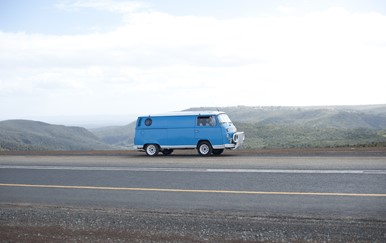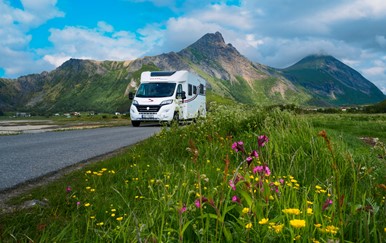The advantages of owning one of these vehicles are endless.
But we know there are bound to be those questions niggling in the back of your mind: how easy are they to drive? What licence do I need? And most importantly, how do I empty the toilet? But fear not, we’ve compiled a list of the most frequently asked questions to cover all of these worries keeping you up at night.


What are the differences between a campervan and motorhome?
Let’s start with the basics, there are subtle differences that set campervans and motorhomes apart. As the name suggests, a campervan is a van with a separate living area in the back. Typically, smaller in size compared to a motorhome, but just as equipped for living with cooking and sleeping facilities. Don’t be fooled by their size though, it makes them easier to drive and affordable - just not as comfortable as a motorhome.
A motorhome, on the other hand, is built onto a truck with a clear divide between the cab and living area. Perfect for the bigger family or group holidays, they are more spacious and contain larger sleeping and kitchen areas along with a bathroom (depending on the size). Both come in a huge variety of makes, models, sizes, and shapes, and don’t forget about the option of upcycling and renovating, so you’ll need to do your research into what will suit your needs best.
Aside from these differentiating features, the rest of the information on this list applies to both campervans and motorhomes.

What types of motorhome are there?
It’s time to figure out which type of vehicle would suit you best:
- Micro – normally small vans that sleep 1-2 people with simple facilities including a small cooking area, cupboard space, and a lifting roof.
- Coach built – it is what it says on the tin: a motorhome body built onto a coach-style vehicle. They generally have enough room for two people with a washroom, toilet, and fixed bed.
- Coach built (with over-cab bed) – this is the same as the above but slightly bigger as it has over-cab storage, which is often used for the over-cab bed, however, others may just use this area as extra storage space.
- ‘A’ class – with the body and driving compartment more coach-built, and no separate cab, you’ll have slightly more room for home luxuries.
- Tag axle – usually large and long with a third wheel fitted on each side (known as the tag axle).
- RV (aka recreational vehicle) – you’re likely to have seen one of these in a film as they’re not typically seen here in the UK, but they are more commonly used in America. As one of the big boys, RV’s are typically large, offer lots of living space, and are on the more ‘luxurious’ end of the motorhome spectrum.

Can I drive a campervan or motorhome with my car licence?
Now, this is a question which can only be answered by asking more questions such as how old are you? What licence and restrictions do you have? And what is your vehicle’s MAM (maximum authorised mass)? According to the gov website:
- For a vehicle weighing 3.5 tonnes, you’ll need a category B license and be over the age of 17
- A vehicle weighing between 3.5-7.5 tonnes will require a category C1 license and minimum age of 18
- For any vehicle weighing over 7.5 tonnes, the driver will need a category C license and be over 21
However, if you are still unsure, you can do a quick survey through gov.uk to find out what you can and can’t drive.

Where can you park a campervan or motorhome?
Whilst there are many choices, the topic of parking can be a tricky one when traveling in a campervan or motorhome. Let’s start with overnight parking – it’s a great option to consider for budgeting, flexibility, and freedom, but remember you’re not allowed everywhere. Where you’ll be welcome to pitch up for the night will be marked as stopover sites and highlighted with a ‘nightstop scheme logo’. If it isn’t, you’ll need to seek the owner's permission, and for most roads, this is likely to be the local authority or Highway Agency.
Wild camping is the same, you’ll still need to ensure you can stay by either asking the landowner or using a dedicated website or app to double-check spending the night is possible (and legal). Don’t assume you can stay somewhere just because it’s isolated or empty – the risk of being angrily woken up at 4 am because you’re on someone’s property is a real one.
When it comes to general parking, some carparks will have spaces reserved for campervans and motorhomes and will be marked with a designated sign. However, all of these options should be considered and researched before setting off – you don’t want to be caught out because you can’t find a place to park, don’t have the cash to cover the fee, or receive a fine because you’ve broken the law!

Are campervans and motorhomes easy to drive?
I think the easier question to ask here is how confident of a driver are you? Campervans and motorhomes are much larger compared to the two or four-wheeled runarounds we’re used to, so to drive successfully confidence and patience are key, as well as good driving skills.
Something to be aware of is the lack of rear visibility but, with the help of larger wing mirrors reversing and getting around, in general, can be simple and easy enough. If you are worried about this, it might be worth looking into mirror extensions which can help to reassure you. Insurance is also a must! Make sure you have the correct policy just in case there are any little accidents. You can read all about what insurance you need here.
And if you are a more nervous driver, there are plenty of driving courses you can sign up for that will give you a taste of what it’s like to be behind the wheel.

What is the speed limit when driving a campervan or motorhome?
As long as the MAM is less than 3 tonnes then you must follow these limits:
- 70mph on motorways
- 60mph on all other roads – unless a lower speed limit applies
If your vehicle’s MAM is over 3 tonnes, then you must follow:
- 70mph on motorways
- 60mph on dual carriageways
- 50mph on all other roads – unless a lower limit applies

What are the road tax rates for motorhomes and campervans?
How much you pay will depend on your vehicle’s MAM and how you wish to pay. Your options include:
- Single 12-month payment
- Single 12-month payment by Direct Debit
- Total of 12 monthly installments by Direct Debit
- Single 6-month payment
- Single 6-month payment by Direct Debit.
Based on this, vehicles are then split into two categories:
Category 1 - Private or light goods (TC11)
- Vehicles weighing 3,500kg or less with an engine size over 1,549 - rates between: £141.75-£270
- Vehicles 3,500kg with an engine size under 1,549 - rates between: £86.63-£165
Category 2 - Private heavy goods (TC10)
- Vehicles weighing over 3,500kg - rates between: £86.63-£165
But, as already mentioned, these will depend on how you wish to pay. To find out which category your vehicle falls into, take a look at the gov.uk webiste.

How comfortable are campervans and motorhomes?
This all depends on the amount you’re willing to spend. You can have a basic setup and spend the bare minimum, but will it be comfortable? With so many DIY and low-cost options out there, it’s easy to kit out your vehicle on a budget.
If you are willing to up the ante and spend that little bit more, you’ll have more freedom and choice on how to make it comfortable. Can you buy a better-quality mattress – the last thing you’re going to want is to wake up with aches and pains from a bad night’s sleep. Can you buy more kitchen equipment so you can make your favourite meals? (Cooking for yourself is also a great way to save money!) Is it possible to include more storage units so your space is less cluttered? (More on this in our guide to maximising your vehicle's storage).
These are all things to consider and, after all, if you’re planning on being on the road for a long period of time you’re going to want to be as comfortable as possible so, it may be worth splashing a bit of extra cash to ensure your journey and experience is the best it can be!

Can I tow a car or trailer when driving a campervan or motorhome?
As long as you’ve got the correct licence that permits you to drive one of these vehicles plus tow a trailer car, and your insurance policy covers it, you’ll be good to go! Just make sure you’re confident enough to handle such a heavy load. Again, if you are interested in what licence you need check out our guide on licence requirements.

Why does my motorhome have two batteries?
Onboard you’ll have 12v leisure batteries, plus a separate battery that starts the engine. The leisure batteries can be charged whilst driving, using solar panels, or through a power supply. The stored energy will then be used to power all your gadgets and appliances.

What tyre pressure does my campervan or motorhome need?
Tyre pressure depends on a variety of things – the brand of tyre, model, type of vehicle and tyre position – most vehicle’s will have a sticker on the inside of the door that tells you the recommended pressure, however, if you are buying second hand then this could be missing.
If this is the case, then you can easily find this out online using your vehicle’s information and measurement value chart.

Do I need seatbelts when driving a campervan or motorhome?
One simple answer, yes. You always need seatbelts. For the safety of your passengers and, if the worst-case scenario did occur, your insurance claim.

How fuel efficient are campervans and motorhomes?
This is something that will be affected by a variety of factors including the age, make, and model of your vehicle. A smaller campervan or motorhome isn’t going to have you at the fuel gauge in shock or horror – we expect you’ll get around 35mpg – it’s the real big boys that will start to guzzle it down like it’s going out of style that you need to be aware of, so just keep this in mind.
But always make sure you do your own research on the model/s you are interested in to ensure its economy suits you.

How much does servicing cost for a campervan or motorhome?
Look to pay around £250 for an annual maintenance check and, if your motorhome or campervan is over 3 years old, it’s also going to need an annual MOT.
However, makes and models can vary greatly when it comes to servicing and maintenance so always do your own research.

Are campervan and motorhomes suitable for children?
It’s actually a great way to travel with the whole family, especially young children. You have the ability to stop and go as you please with added space to entertain the family – there’s nothing worse than being stuck in a cramped car with your mother, brother, sister, dad, dog, and all the luggage.
And finally, the question we all want to know but don’t want to ask...

How do you empty the toilet?
It’s actually easier than you would think and after extensive research, I’ve learned how to do it within 5 minutes. However, whether you need to know this or not depends on the size of your vehicle as not all will have the space to include toilet facilities.
This isn’t a question I will actually answer, but if you are interested there are some handy videos on Youtube that will turn you into an expert in no time! And one thing I will say is that it will make you aware of how much water we actually waste in day-to-day life – so, silver linings eh?
There we have it!
I’ve gone through the most commonly asked questions by campervan and motorhome owners. If you did have a question which we haven’t covered make sure to ask it in the comments below or message us on social media.
Last but not least, if you are looking for campervan or motorhome insurance, make sure to get a quote direct with Lexham!









